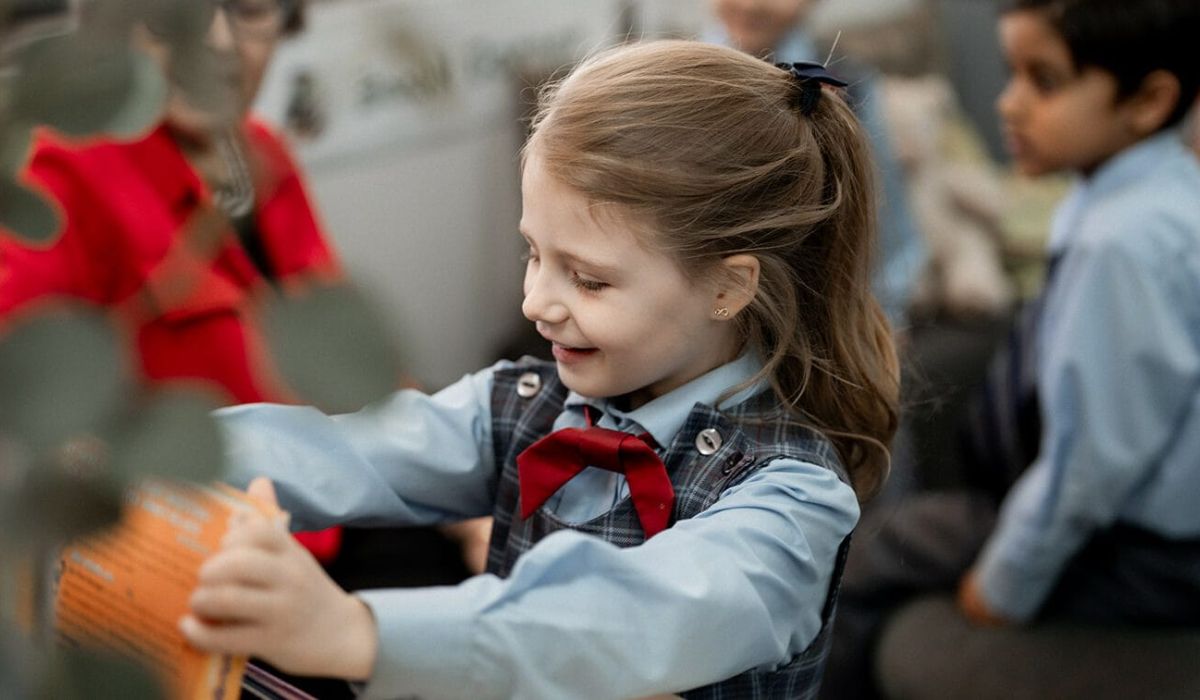
Preparing for Kindergarten
Authored by Ms Geneva Clayton – Head of Junior School
Starting Kindergarten is an exciting time for your child and family. At The Illawarra Grammar School, we understand that this new chapter comes with a mix of emotions, from anticipation to curiosity. Helping your child develop independence and school-ready behaviours will make their transition smoother and foster a love for learning. Below are some recommendations to support your child in preparing for this important transition.
1. Develop Independence
Kindergarten is a wonderful opportunity for children to grow in independence. Here are some skills to work on before the school year begins:
-
Dressing Themselves: Encourage your child to practice putting on their uniform, including fastening buttons, zipping jackets, and putting on socks and shoes. Velcro or slip-on shoes can be helpful in Kindergarten.
-
Using the Bathroom: Ensure your child feels confident using the bathroom independently. Practise proper handwashing techniques and remind them to flush and close the door every time.
-
Packing and Managing Their Belongings: Introduce your child to their school bag and lunchbox (including recognising the name label). Practice opening and closing their lunchbox, drink bottle, and any containers. Teach them to pack their belongings and take responsibility for keeping their items together.
2. Develop Functional School Behaviours
Helping your child adjust to the rhythms and expectations of a classroom is vital for their success. Focus on these behaviours:
-
Listening and Following Instructions: Play games that involve listening and following directions, such as “Simon Says” or simple obstacle courses. This helps your child practise paying attention and responding to guidance.
-
Waiting and Taking Turns: Kindergarten often involves group activities where patience is essential. Encourage turn-taking through board games, sharing toys, or waiting in line.
-
Sitting for Short Periods: Help your child get used to sitting and focusing for brief intervals. Read stories together or engage in quiet activities like drawing or puzzles to build their stamina to concentrate.
3. Build Emotional Readiness
Adjusting to a new environment can be overwhelming for some children. Supporting their emotional readiness will help them feel secure.
-
Talking About School: Discuss what they can expect at school, such as meeting new friends, learning fun things and playing on the playground. Answer their questions and address any worries with reassurance. Closer to commencing, we provide families with our ‘Welcome to Kindergarten’ book which we encourage you to read in the lead up to starting school.
-
Naming and Expressing Feelings: Teach your child to recognise and verbalise their emotions. Role-play scenarios they might encounter, such as feeling nervous or needing help, and practise responses like asking a teacher for assistance.
-
Separation Practice: If your child hasn’t spent much time away from you, arrange short separations with a trusted adult to build their confidence.
4. Encourage Social Skills
Interacting with peers is a significant part of the Kindergarten experience. Focus on these skills:
- Sharing and Cooperation: Encourage activities that involve taking turns, such as playing board games, working on a puzzle together, or sharing toys with siblings and friends.
- Introducing Themselves: Role-play simple conversations where your child can practise greeting others, introducing themselves, and ask questions like, “What’s your name?”
- Resolving Conflicts: Teach your child simple conflict resolution strategies, such as using words to express their feelings and finding fair solutions. Phrases like “Can I have a turn after you?” or “Let’s play together” can be helpful.
5. Establish Routines
A predictable routine helps children feel secure and ready to learn. In the weeks leading up to school, set a schedule that includes:
- Consistent Bedtime and Wake-Up Times: A well-rested child is more alert and ready to learn. Begin adjusting bedtime and wake-up times a few weeks before school starts to help your child adapt to the new routine.
- Mealtimes and Snacks: Encourage your child to eat meals at regular times and practise opening lunchboxes, drink bottles, and any packaging they will need to manage independently at school.
- Morning Routines: Rehearse the steps of a school morning, including getting dressed, brushing teeth, having breakfast and packing a school bag. Making this routine familiar will reduce stress on the first day.
6. Familiarise Your Child with the School Environment
- Visit the School: The Illawarra Grammar School offers multiple orientation visits for Kindergarten students. These visits allow children to explore their classroom, meet teachers, and interact with future classmates in a supportive setting.
- Practice the Journey: Whether walking, driving, or taking the bus, practice the route to school so it feels routine.
- Talk About the School Day: Discuss what a typical school day might look like, from morning arrival to lunch breaks and home time. Reassure your child that teachers and staff are there to support them every step of the way. The use of images can sometimes be helpful also.
7. Label Everything
From uniforms to lunchboxes, labelling items with your child’s name will help them (and their teacher!) keep track of belongings. Teach your child to recognise their name to easily identify their things.
8. Learn Early Literacy Skills
Developing literacy skills early helps your child feel confident and prepared for the classroom environment. There are a number of activities that can encourage this development:
- Reading Together: Read everyday by sharing stories and picture books. Point to words as you read to help them understand the movement of text, left to right.
- Recognising Letters and Sounds: Introduce your child to the alphabet by identifying letters in their name and learning the alphabet rhyme. Move to then ‘sounding out’ the sounds in words to develop their early phonemic awareness knowledge. Identifying the first sounds in words is the first step in recognising sounds.
- Encouraging Storytelling: Ask your child to describe their day or make up stories to enhance their imagination and language skills. Talking out loud is important as this helps with vocabulary development.
- Name Recognition and Writing: Practise recognising and writing their name. Use both uppercase and lowercase letters, distinguishing between the two. Simply using pencils and paper to explore letter shapes and sound sequences is encouraged.
9. Learn to Count and Develop Numeracy Skills
Building early numeracy skills helps your child develop a strong foundation for mathematical thinking. The following is suggested to build numeracy confidence:
- Counting Practice: Practise counting aloud to develop number sequencing and fluency. Count everyday objects together, such as objects and steps. Encourage the use of fingers to point and count the numbers (1:1 correspondence).
- Number Recognition: Point out numbers when you see them in the environment, such as on clocks, cars or house numbers. Practise identifying numbers from 0 to 10 and eventually move on to higher numbers as their confidence increases.
Sorting and Classifying: Encourage sorting by different attributes. Let your child explore various themes i.e. size, shape or colour using household items or toys. This helps with pattern recognition and developing the ability to categorise. - Playing with Shapes: Look for shapes in the environment and point these out, such as circles, squares and triangles. Build with blocks or draw pictures to reinforce spatial awareness.
- Understanding Patterns: Patterns are everywhere in our world. Help your child notice and create simple patterns, like alternating colours or shapes. This strengthens their ability to recognise sequences and logic.
Both literacy and numeracy skills build the confidence and skills needed to thrive in the classroom.
Final Thoughts
Starting school is a significant step in your child’s journey, and with preparation and encouragement, it is a joyful experience. By focusing on independence and school-ready behaviours, you’re giving your child the tools they need to thrive at the Illawarra Grammar School. Remember, our staff are here to support you every step of the way. Together, we make your child’s transition to Kindergarten a smooth and exciting adventure!

